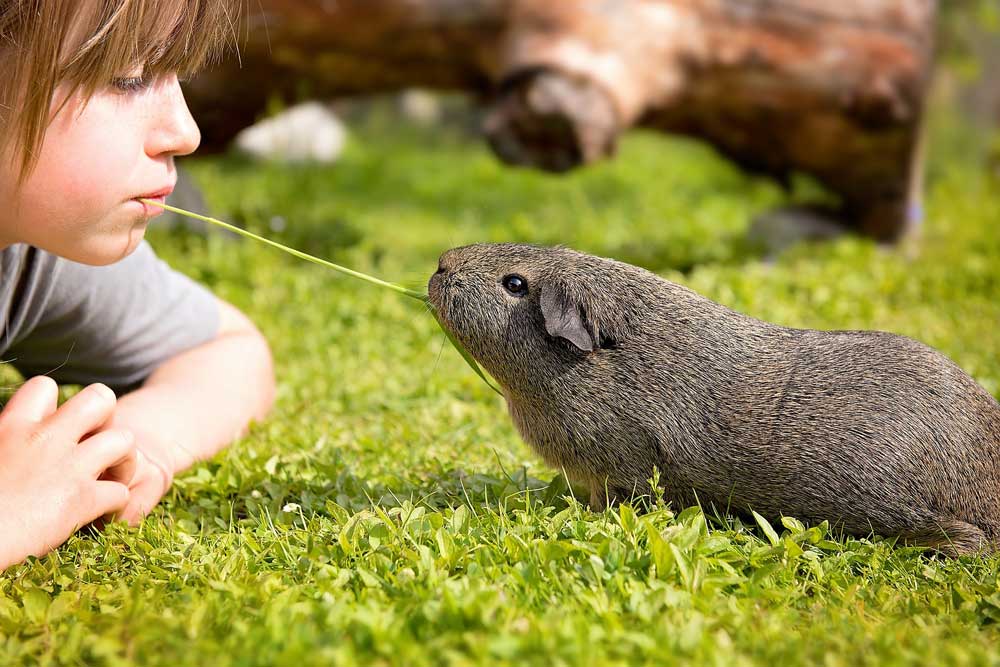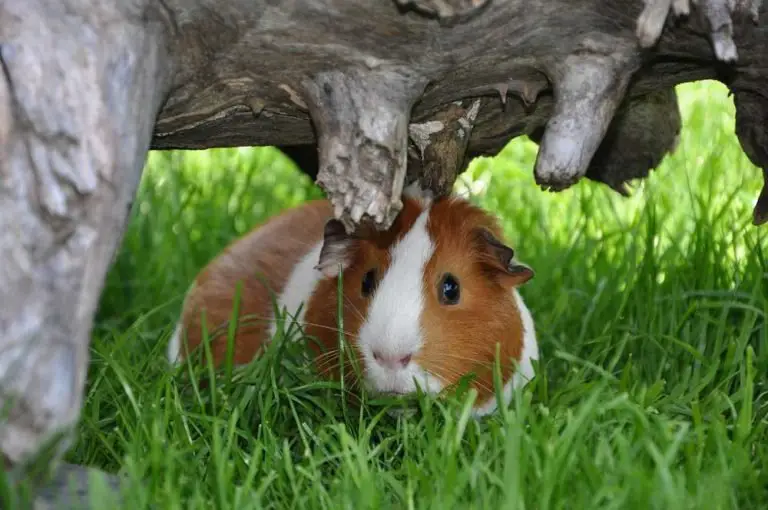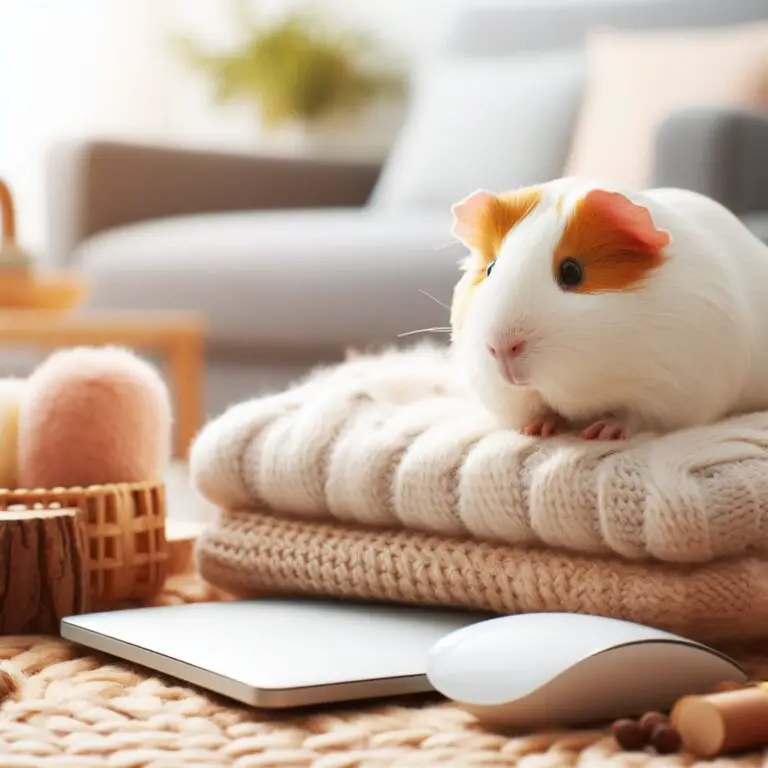Can Guinea Pigs Eat Grass Clippings?
Guinea pigs are herbivorous animals that mainly eat veggies, fruits, and hay grass. They need to keep on chewing due to their ever-growing teeth that need to be shed.
The roughage found in their foods helps them in shedding off these teeth. Lack of hay and grass in their diet brings about dental problems and digestive issues making it important for guinea pig owners to provide them.
Lawn grass that has just been cut may look tempting and small enough for our small pets. But is it safe?
Read on to learn more.
Can guinea pigs eat grass clippings?
Guinea pigs should not eat grass clippings. Grass clippings are toxic and harmful to them bringing about gastrointestinal blockages. This is because grass clippings are contaminated with dirt, weeds, bird droppings, and mower exhaust. These contaminants get mixed up with grass as it’s being cut and they can make guinea pigs sick if they eat them.
Contaminants in grass clippings
Grass clippings are the grass that has been cut from a lawn using a lawnmower. A lawn has many contaminants that make grass clippings unsafe and that’s what we are going to be looking at.
Pesticides
Pesticides and insecticides are sprayed in lawns to manage pests and insects. They contain chemicals that are harmful to guinea pigs if ingested.
Waste in grass
Animal waste like bird droppings could be easily mixed with the clippings during mowing. This can make guinea pigs sick.
Lawnmower exhaust
Fumes have been long known as pollutants. As the lawnmower exhaust comes into contact with the grass clippings it could contaminate them.
Mushrooms
Mushrooms love moisture. They can be growing on a lawn where the grass is being cut.
This leads to the mixture of the mushrooms with the grass. Mushrooms are toxic to guinea pigs and if they eat the clippings they will get sick.
Fermentation
The heat produced by the lawnmower coupled with the crushing action and warm weather brings about the fast fermentation of grass clippings. If eaten they could upset the balance of bacteria in the digestive system upsetting the stomach and bringing about bloating and diarrhea.
Small in size
Grass clippings are very small in size making guinea pigs not find the need to chew the tiny pieces. Due to that, guinea pigs tend to overconsume them.
This brings about a build-up of gases and bloating that can be fatal as guinea pigs do not have a way of getting rid of excess gas.
According to RSPCA, you should only give guinea pigs grass, herbs, fruits, and veggies that have not been contaminated with chemicals as they could be harmful to guinea pigs.
Lawnmower clippings bring about gastrointestinal blockages and make your guinea pigs sick. Never give those to guinea pigs.
Is grass good for guinea pigs
Yes. The grass is good for guinea pigs. It helps in the functioning of their guts, is rich in Vitamin C (which guinea pigs lack), and it contains other vitamins and proteins.
If you don’t feed your guinea pigs grass as a norm, you can begin feeding it to them in small bits. Handpick fresh and tender grass and wash it well to remove all dirt and bacteria.
As you introduce grass to guinea pigs, just like with all other foods, do it in moderation. Feed them a little at first and wait for around 12 hours while checking for negative side effects like stomach upsets.
If you notice none, then your guinea pig is good to go. Keep feeding them the grass together with other guinea pig foods.
Good grass for guinea pigs is Timothy hay and Barley. They are low in calcium and quite popular with guinea pig owners.
Avoid the likes of Alfafa and Clover hay because they are high in proteins and calcium. High calcium brings about health issues like bladder stones.
Feeding guinea pigs grass
Hay is a type of grass and it’s always recommended to give guinea pigs a lot of it. You should make sure that it’s available in the cage at all times.
This is due to their need to keep chewing to wean their long teeth and avoid painful overgrowth of the teeth.
Hay is also utilized as bedding in the cage. Guinea pigs are constantly pooping and urinating on their bedding making it essential to change them frequently.
All hay should be fresh and of high quality and not moldy and old. Guinea pigs need to be provided with new hay every day to maintain hygiene in the cage and to ensure they get healthy roughage.
Instead of having the hay strewn all over the floor of the cage, you can build a rack in the cage so that it will hold the hay. This will maintain cleanliness and ensure that the hay they are eating is not soiled which could make them sick.
Other foods
Although hay grass is the main food for guinea pigs, they need other nutrient-rich foods to have a balanced diet and not get bored of eating the same thing every time. Give them a variety of fresh veggies like kales, broccoli, and cabbages; fruits like mangoes and apples without their seeds; and herbs like basil and coriander.
Remember to provide foods rich in Vitamin C like carrots and berries. Fruits with high sugar content should be given in small quantities and only occasionally like once or twice a week.
To prevent dehydration, place multiple water bottles in the cage.
Can guinea pigs be left to graze?
Yes, guinea pigs can be let out to graze if you have an area with grass. They will enjoy grazing in nature and roaming around freely.
If you do not have a grazing space, you can still let them out in an enclosed place and provide cut grass, not grass clippings. You should ensure that the grass you give to your guinea pigs is safe and not sprayed with chemicals.
Also, avoid roadside grass which has been contaminated by exhaust fumes and animal droppings.
Always pick healthy-looking grass and wash it thoroughly before giving it to your pet. You don’t want your guinea pig falling sick.
Conclusion
The grass is full of fiber which aids in digestion for the guinea pigs’ delicate digestive tract. Do remember to deworm your pets regularly.
When letting them outdoors, make sure they are not stepping on wet grass to prevent Urinary Tract Infections (UTIs). Always keep an eye on them to make sure they are safe and do not wander away.
References:
Royal Society for the Prevention of Cruelty to Animals(RSPCA).


![Can Guinea Pigs Get Hiccups? [Reasons & What To Do!]](https://atractivopets.com/wp-content/uploads/2020/10/Guinea-Pig-15-768x541.jpg)


![Do Guinea Pigs Blink? [Signs & Treatments of Eye Infections]](https://atractivopets.com/wp-content/uploads/2020/10/Guinea-Pigs-Blink-768x511.jpg)
![Can Guinea Pigs Eat Strawberries? [Feeding Guide!]](https://atractivopets.com/wp-content/uploads/2020/10/Guinea-Pigs-768x536.jpg)
